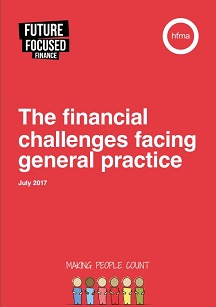Feature / Primary support
A lot of the commentary around service transformation and new models of care has focused on the impact on hospitals, but less has been said about how it will affect general practice. Like its hospital-based counterparts, primary care is battling with rising demand and workforce shortfalls. Add in practice closures and new demands such as evening and weekend access, as well as the potential transfer of care out of hospital, and there is also uncertainty about the future structure of general practice.
Against this background, the HFMA and Future-Focused Finance (FFF) launched research earlier this year to gather GP and practice manager opinion about the sustainability of general practice and to clarify the support they need to manage the financial challenges ahead. The report, The financial challenges facing general practice, published in July, says that on the first count the message is clear – 87% of respondents were either not at all confident or had concerns about the financial outlook for their practice in two or three years’ time. Respondents said the most significant pressures were: the inability to meet existing or growing demand within current core funding (94%); growth in obligatory costs (90%); and capacity needed to deliver additional activity (90%).

Looking ahead
Despite the gloomy financial forecast, just under two-thirds thought their practice would still exist in five years – either as a distinct organisation or as part of a larger provider such as a GP federation or alliance. The remainder believed their services would be provided by acute or community service providers. While some GPs have voiced fears about being railroaded into new service structures, in the survey there was a clear preference for practices to get together in federations or other forms of merger. Respondents felt these models, rather than being part of acute or community providers, were more likely to promote general practice sustainability.
The survey said there was a gap in financial knowledge, with respondents calling for training on the financial implications of federation or alliance working, as well as broader aspects of NHS finance, including clinical commissioning group finance, NHS contracts and the Five-year forward view.
Liz Angier, a portfolio GP in Southampton, points to the training priorities of family doctors and practice managers. ‘Finance training is always needed,’ she says, ‘maybe not in the traditional aspects, which they are already familiar with, but on newer forms – such as on federation/alliance, primary care and wider NHS finance.
‘The survey shows they want that type of training, but also the training requirements might be specific to different layers of the workforce – salaried GPs, locums and partners might have different interests.’
FFF Clinical partnering lead Sanjay Agrawal (pictured) – who is also consultant in respiratory and critical care medicine at the University Hospitals of Leicester NHS Trust – says there are several points to take away from the survey. ‘Many general practices are worried, or at least not confident, about the future,’ he says. ‘That worry is around a number of areas – whether they are going to be in the same form as today, a federation or part of a PACS [primary and acute care system] or MCP [multi-specialty community provider]. 
‘Most felt they were going to change in some way, but the preferred model was a federated model. Even then, they are worried about how they get from where they are today to the best federated model.’
Federations are defined quite broadly, says Dr Agrawal. Some are formal, sharing back office functions, for example, while others are federations in name only and lack the focus on collaboration. ‘That’s why we identified that it’s not just about the information, it’s about the skill set or helping them to be able to federate. That’s where they want more input, whether from CCGs or local medical committees.’
The report recommends CCGs undertake detailed capacity planning for work transferring from secondary to primary care and ensure training and recruitment needs are met. CCGs and local medical committees (LMCs) should discuss future models with small practices and the former should consider providing non-recurrent funding and professional advice to support the development of federations and alliances. It adds that CCGs should work with federations and alliances to find the most efficient ways of releasing back-office savings.
Dr Agrawal suggests closer working between LMCs and CCGs locally could produce the best outcomes. GPs are more likely to see LMCs as friendly, while CCGs can drive forward the NHS England agenda.
He adds that training on the finances of the wider NHS could be useful, but resources will also be needed. ‘The ills of general practice will not be cured with just a bit more training. In the survey, people are making the point that they are under-resourced for the demand that’s currently there and it’s likely to grow, based on the ambition of moving secondary care services out of hospital and into primary care. There’s a resource gap for staffing, for back office and for other skills.’
Data collection burden
The burden of data collection on general practices seems ‘enormous’, Dr Agrawal says, and he was surprised how much information was required. Survey respondents said information provided by CCGs varied and, though most received information on spending on medicines, just over a quarter were given figures for direct access diagnostics. GPs wanted to receive data on medication spending, with local and national benchmarks, while practice managers were also interested in more information on secondary care referrals.
The report suggests that CCGs should streamline their data requirements, only collect information that’s absolutely necessary, and ensure that the practices understand why the data being collected is needed. Commissioners should consider how performance information could be collected centrally from existing data sources to minimise the burden on practices.
CCGs need a greater understanding of general practice and the fact that they are small businesses that depend on smooth cash flow, Dr Agrawal says. The report recommended organisations contracting with general practice recognise the commercial realities of general practice and ensure payment for additional services is simplified and aligned to the underlying cost profile of the service delivery.
‘Contract payments come in a block every quarter or every year, but you have to pay staff every month. There must be a better alignment of payment for work,’ he says.
Dr Angier adds that if practices don’t get paid on time they cannot recruit or retain staff and run their service, which is facing many complex demands. Ongoing payment delays can interrupt workforce remodelling and planning. Workforce capacity and new ways of delivering the service need to be supported financially for the shift in care to the community to be realised, she says.
Would the recommendations lead to a change in CCG duties, giving them a more strategic role? This could happen, Dr Angier says, but there may be a question mark over the long-term future of individual CCGs. Perhaps local commissioning groups could become part of the wider sustainability and transformation partnerships, which are acting strategically.
‘Hospitals and CCGs, and now STPs, are trying to look at costing healthcare pathways, but this is nuanced and difficult,’ she says. ‘How do you calculate return on investment? Would this include a marker for avoidance of admissions, fewer emergency admissions or inpatient bed days, fewer initial outpatients, fewer follow-ups, or better patient outcomes and experience and quality or life?
‘There will also be a cost of upskilling staff and equipping integrated teams to deliver care in the community.’
However, there could be advantages, particularly given that many STPs are looking at population-based health models with population sizes of 30,000 to 50,000 – which is seen as the optimum range for good population health management. ‘In an ideal world, it would mean clear and quick transactions, the ability to have funds to employ interdisciplinary teams, dashboards that monitor activity and outcomes and peer support for practices,’ says Dr Angier.
The report recommends CCGs provide support and appropriate costing information to practices involved in designing new pathways to ensure decisions are financially sound. The HFMA has started masterclasses on costing pathways, Dr Angier says.
She adds that, in the future, a combined approach – with finance staff working alongside clinicians, looking at guidelines and current practice and then considering which treatment and information is best for patients as part of a pathway – could lead to shared learning in delivering care and better outcomes. Closer working between clinicians and protected and funded time for training in finance matters could help solve some of the current difficulties.
Unanswered questions
The survey covers some aspects of primary care, adds Dr Angier, but many questions are still unanswered and future surveys could be devised to look at ongoing barriers and facilitators in the changing landscape.
‘The development of trust, and good working relationships with local finance directors, is important,’ she adds. ‘It may be time they played a wider role in sharing their expertise while also being supported to understand the different clinical contexts and the population-based health approach.’
General practice is in a state of flux, with uncertainty over future delivery models and finances running in parallel to rising demand and workforce issues. But practices would welcome the help of finance professionals – to explain the financial implications of new models, as well as broader aspects of NHS finance, to help them move to the new federations and alliances; to support greater efficiency; and to work with them to develop financially robust patient pathways.
Related content
We are excited to bring you a fun packed Eastern Branch Conference in 2025 over three days.
This event is for those that will benefit from an overview of costing in the NHS or those new to costing and will cover why we cost and the processes.